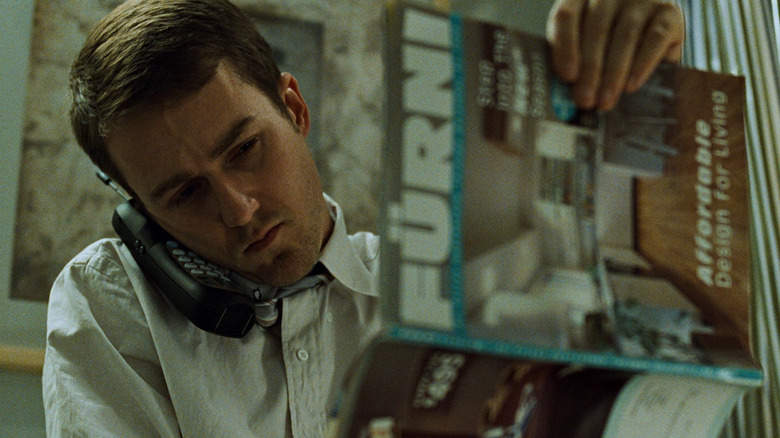David Fincher Breaks Down That Censored Chinese Fight Club Ending
The saga of the censored "Fight Club" ending continues. Director David Fincher has now spoken out about the decision to excise footage from the end of his oft-misinterpreted 1999 film. It happened like a reverse Tyler Durden move, except this act of splicing mayhem was on the Chinese streaming service, Tencent Video, and not in a projection room with cigarette burns appearing over the Brad Pitt character's cannonball shoulder.
If you're just now joining us, the saga began when news broke that Tencent had replaced the usual "Fight Club" ending with a descriptive caption, which, ironically, hewed closer to Chuck Palahniuk's novel. This is something Palahniuk himself noted when he spoke out about it to TMZ. The new ending sent Tyler (or the nameless Narrator, played by Edward Norton, whose subconscious conceives Tyler as an imaginary friend) to a mental health facility, similar to his fate in Palahniuk's book.
Tencent subsequently restored Fincher's original ending as news of its censorship spread, and I'm sure that China itself would much rather us talk about the ongoing 2022 Winter Olympics in Beijing. But if you were wondering what Fincher has to say about the whole affair, he recently spoke to Empire about it, where he said:
"It's funny to me that the people who wrote the Band-Aid [ending] in China must have read the book, because it adheres pretty closely."
As to how it all happened in the first place, Fincher said:
"Here's what we know. A company licensed the film from New Regency to show it in China, with a boilerplate [contract]: 'You have to understand cuts may be made for censorship purposes.' No-one said, 'If we don't like the ending, can we change it?' So there's now a discussion being had as to what 'trims' means."
'If You Don't Like It, Why Did You License the Movie?'
Fincher was reportedly "bemused by the whole situation," which seems like a healthy attitude to have. However, he did point out the inherent absurdity of a platform acquiring a film for its streaming library, only to radically alter it. As he put it:
"If you don't like this story, why would you license this movie? It makes no sense to me when people go, 'I think it would be good for our service if we had your title on it... we just want it to be a different movie.' The f***ing movie is 20 years old. It's not like it had a reputation for being super cuddly."
Fincher has a point, but in all fairness to the Chinese ... think of what it's like for a streaming service in that country to cater to the needs of cinephiles there, while also living under China's strict censorship system, whereby criminals in movies "must always be punished for their crimes onscreen and societal harmony restored."
This is why the powers that be censored that "Fight Club" ending in China, and I honestly believe that the only reason it got uncensored is because it was bad PR for the Olympics. Maybe, for them, a censored "Fight Club" was better than no "Fight Club" at all?
Is anyone reading this from China, or would a foreign entertainment site like /Film not make it through the Great Firewall?

